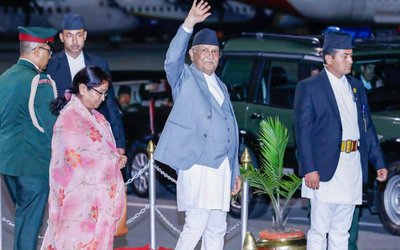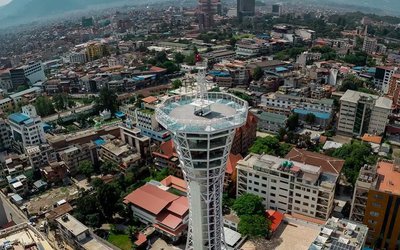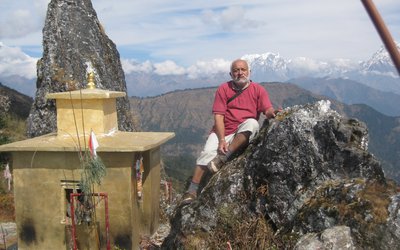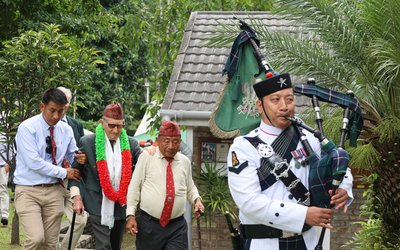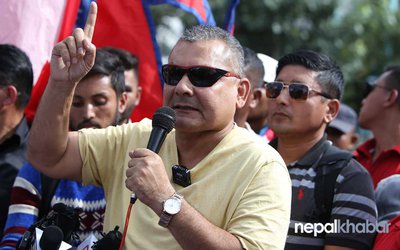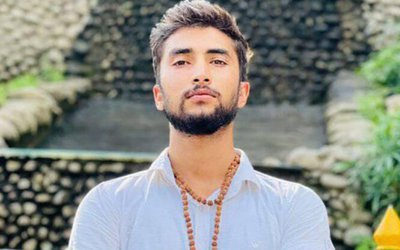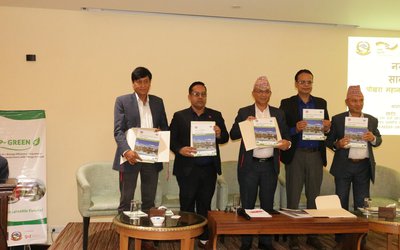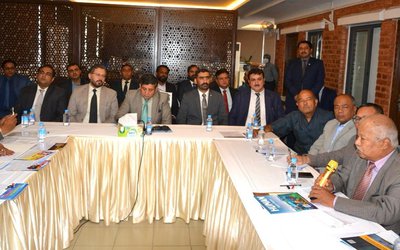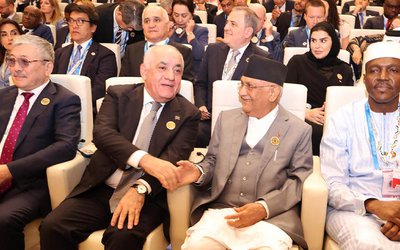Why would the very foundation of Nepal’s republican order shake as if hit by a massive earthquake when King Gyanendra is referred to by ordinary folks as ‘King’ or when he delivers new year’s greetings? That too after two decades of his being sidelined from statecraft duties and a decade after the new republican constitution was promulgated? A wide spectrum of Nepalis across the nation are asking these questions, and wondering if there is not some fundamental flaw underlying the current dispensation.
The answer lies in the old expression of someone being scared of his own shadow. It is not just the plentiful corruption scandals that are tumbling outevery day: they are but symptoms of the deeper rot that began over three decades ago. It lies in the morally unjustifiable misdeeds of our Loktantricksters in ushering in the present federal, secular republic. Worth recalling are some critical incidentsthat help in understanding why the current leaders – who have been in power and top power positions both in their parties and in the government for the last three-and-a-half decades – exhibit such a total lack of self-confidence in their own absolute rule.
It begins way back in mid-2002 when there was a majority Nepali Kangress government led by PM Sher Bahadur Deuba. Two things happened, one openly and the other subterranean, the latter having been confessed to by India’s Jawaharlal Nehru University academic and Nepal expert Prof. S.D. Muni in the notorious book edited by Canada’s ex-ambassador to Nepal among others (Einsiedel, Malone and Pradhan (eds), Nepal in Transition: from people’s war to fragile peace, Cambridge University Press, 2012). In it, Muni admits that India had decided to get rid of Nepal’s monarchy by June 2002 because “it was not looking after India’s interests”. With that decision (first by prime minister Atal Behari Vajpayee and pursued more vigourously by Man Mohan Singh), India beganto more openly use Maoist rebels and their leadership safely ensconced in Delhi against Nepal’s multiparty democracy and constitutional monarchy.
The more open shenanigans began a few years earlier within Nepal that allowed foreign players to actively interfere in Nepal’s affairs. KP Bhattarai had been elected as PM after the 3rd general electionsin May 1999 that preceded multiple “musical chair” coalition governments and attendant corruption after the second general election. Bhattarai was successful in bringing Kangress back to power with a majority in parliament. By March 2000, Kangress party chief Girija Koirala, who exhibited no democratic character whatsoever and could not stand anyone becoming prime minister other than himself, had Bhattarai ousted for no reason other than to make himself PM. (It is widely suspected Girija had his eyes on the hefty commissions that could come his way from arms purchase for the Royal Nepal Army!). Increasing unpopularity of Girija following the Holeri Maoist humiliation in July 2001, forced him to hand over the PM position to Deuba, only to have Girija engaging in machinations to oust him, forcing Deuba to dissolve the parliament May 2002.
It must be noted that it was NOT King Gyanendra that dissolved the parliament (as party propaganda has it): it was Nepali Kangress infighting that led Deuba to do so, a move the constitutional monarch had no power to over-ride, and something the Supreme Court too approved. One accusation from Kangress ranks is that the King manipulated Deuba to get him to dissolve the parliament, that Deuba surrendered democracy to the palace; but this charge immediately backfires on them. If so, how is it that Kangress to this day keep the person that was so manipulatable and who so “destroyed democracy” as its party president and possibly future prime minister?
Deuba, however, was unable to hold elections within the six months stipulated by the constitution, and instead requested the King to extend his term by 14 months, something that would have been unconstitutional, unethical and would have sent the opposition UML into the streets in violent protests. The King had to dismiss him as incompetent. Two governments led by Lokendra Bahadur Chand and Surya Bahadur Thapa followed but while no corruption scandals were associated with them, they could not hold elections as the Kangress and UML would not go for elections unless they held the reins of government themselves. This period also saw the Maoists pull out of the peace process initiated by the Chand government in early 2003 under Indian pressure and resume violence. The King brought Deuba back as PM with the UML in coalition, but even this outfit was unable to bring the constitution back on track by holding elections. It forced the King to try doing that himself on 1st February 2005.
Many say this was a wrong move by the King, even though it was neither constitutionally nor intentionally incorrect for a head-of-state facing an impasse created by the parties. However, by now the Seven Party Alliance had begun cozying up with the Maoists and their foreign handlers. And instead of going to the people for a fresh mandate, they began arguing (in reality most undemocratically) for a resurrection of the dead parliament they themselves had killed and whose 5-year mandate given by the people had expired.
Another international incident – which this time, unlike the covert Indian government one in 2002, happened very much in the open – was the 12 November 2005 Dhaka SAARC summit where US-beholden Man Mohan Singh wanted to bring in US-occupied Afghanistan into SAARC as a member. King Gyanendra did not think this was a good idea as it would harm the non-aligned philosophy and image of South Asia. His resistance earned the ire not just of India but also that of the US which had hitherto not been favourable to India’s promoting the Maoist insurgency. (US ambassador James Moriarty even went to the undiplomatic extent of saying that the King would have to leave Nepal hanging on the tail of a helicopter. Irony of ironies, the King is still very much in Nepal whereas it was the US that literally had to flee Afghanistan in that shameful manner!)
Before the King had even returned from Dhaka, India brought together the Delhi-based Maoists and leaders of the Seven Party Alliance (SPA) to sign the notorious 12-point Delhi Deal that had the full backing of both the US and EU. Anti-King agitations intensified with their succor and INGO largesse with the King ultimately agreeing to hand over power to the seven parties through a 5-point agreement on 24th April 2006. Item 2 of the agreement stipulated that the King through his command would resurrect the dead parliament and item 2 that multiparty arrangement would be continued, both of which the King fulfilled. (It must be noted that ex-PM KP Bhattarai and ex-Kathmandu Mayor PL Singh, both members of that dissolved house, refused to attend what they saw was an illegitimately resurrected parliament!)
Item 1 said all political changes would be done within the framework of the 1990 constitution and Item 4 stipulated that constitutional monarchy would be retained through the ages. Item 5 obliged both the King and SPA to honestly implement the above points, which unlike the King, however, the SPA on its part brazenly dishonored. They swore their oath of office on the 1990 constitution but went on to tear it up, first by inducting over 80 Maoists into the parliament who had never faced the electorate, and later by tearing up the constitution without a single attempt at amendments.
They also passed a law through the resurrected parliament that said even a King’s daughter could be “king” – which proved that the 2005/06 agitations were never about republicanism. Then they passed a motion saying that the forthcoming Constituent Assembly (CA) would, in its first sitting, declare the country a republic, violating the principle that each parliament is sovereign and cannot be ordered by anyone. And in that first sitting, the motion to declare Nepal a republic was tabled by someone who was not even a member of the house – home minister Krishna Sitaula who had lost the election! The fact that the CA could not even find a bona fidesitting member to table the motion and went on to vote in its favour proved its spinelessness. When that CA dissipated ignominiously – despite several extensions of its expired natural life – without making the constitution, in a sense, that illegitimate republican declaration too died with it.
Similar stories repeated themselves regarding other “imported” agendas such as secularism and federalism. Indeed, we have former chief whips, ministers, prime ministers and others surprisingly feigning innocence about how secularism was inserted into house resolutions! Today, a majority Kangressis seem to favour retaining Nepal’s Hindu identity, although those voices surprisingly go silent when unholy coalitions are formed and ministerial berths are handed out. Kathmandu and Dhulikhel municipalities have openly declared that federalism and the resource sucking provincial governments should be done away with.
It is the knowledge of these profane actionsand their corruption sagas galore going back to the mid-1990s – interestingly by the very same leaders of Loot-tantra who have been in power for over the last three decades– etched indelibly into Nepal’s political history, that scares the living daylights out of them whenever the King is mentioned. He lives rent-free in their heads as a disturbing voice of conscience. On the other hand, in the minds of an ever-increasing number of ordinary Nepalis who have begun to understand with what calumny he was sidelined, he represents a national hope and salvation from the current kleptocratic cesspool.

Dipak Gyawali
Gyawali is Pragya (Academician) of the Nepal Academy of Science and Technology (NAST) and former minister of water resources.
- Navigating An Uncharted, Unravelling World Order
- Jun 19, 2025
- Overcoming Indo-Pak Conflict The Dara Shikoh Way
- May 13, 2025
- Re-Thinking Democracy: Why South Asians Are worried
- Mar 17, 2025
- Nepal’s Governance Mired In Endemic Corruption
- Feb 20, 2025
- What Might The Age Of Trump Look Like?
- Jan 22, 2025

